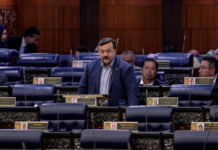KUALA LUMPUR, June 5 — The Malaysian Communications and Multimedia Commission (MCMC) has urged state governments to take immediate action in facilitating telecommunication infrastructure initiatives.
MCMC in a statement today said this is to realise the government’s policy of communication services as a public utility, following the surge in demand due to the new norms faced by the people, which require a lot of matters to be done online such as working, education, shopping and interaction.
“The needs are becoming more urgent due to the ongoing global trend that is shifting towards 5G-based developments, the Fourth Industrial Revolution (4IR) and Digital Economy,” read the statement.
Many efforts have been implemented towards digitalisation, among others through the MyDigital Action Plans that consist of sustainable digital infrastructure construction, under several initiatives such as the National Digital Network (JENDELA) and the forming of Digital Nasional Berhad (DNB), according to the commission.
However, it said that the efforts are at risk of being stunted if the the state governments fail to implement changes in related policies and to reduce the cost, to enable faster infrastructural construction.
As such, MCMC called for the state governments cooperation’s so as to produce positive impact towards the level of infrastructural preparedness and closing the digital gap among the people, for them to take advantage of the digital transformation.
“MCMC through its branch offices in every state will also conduct direct discussions and assist the state governments in applying the Communication Infrastructural Planning Guidelines (GPP-I) and study all aspects of regulations and fees imposed, to ensure all initiatives in building sustainable communication infrastructure will not be interrupted,” added the statement.
It also stated that Communications and Multimedia Minister Datuk Saifuddin Abdullah had made the same call via an online press conference after a Cabinet Meeting on June 3, during which the Cabinet had agreed to include communication services as one of the basic necessities after water and electricity supply.
















